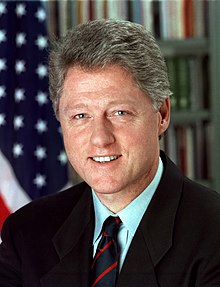
Back رئاسة بيل كلينتون Arabic Προεδρία του Μπιλ Κλίντον Greek Presidencia de Bill Clinton Spanish Présidence de Bill Clinton French Presidenza di Bill Clinton Italian Bill Clintons regjering NB Gabinet Billa Clintona Polish د بیل کلینټون ولسمشري Pashto/Pushto Presidência de Bill Clinton Portuguese Президентство Білла Клінтона Ukrainian
 | |
| Presidency of Bill Clinton January 20, 1993 – January 20, 2001 | |
| Cabinet | See list |
|---|---|
| Party | Democratic |
| Election | |
| Seat | White House |
|
| |
| Archived website Library website | |
| ||
|---|---|---|
|
40th & 42nd Governor of Arkansas
42nd President of the United States
Policies
Appointments
First term
Second term
Presidential campaigns Controversies
Post-presidency
|
||
Bill Clinton's tenure as the 42nd president of the United States began with his first inauguration on January 20, 1993, and ended on January 20, 2001. Clinton, a Democrat from Arkansas, took office following his victory over Republican incumbent president George H. W. Bush and independent businessman Ross Perot in the 1992 presidential election. Four years later, in the 1996 presidential election, he defeated Republican nominee Bob Dole and Perot again (then as the nominee of the Reform Party), to win re-election. Clinton was limited to two terms and was succeeded by Republican George W. Bush, who won the 2000 presidential election.
Clinton's presidency coincided with the rise of the Internet. This rapid rise of the Internet under Clinton led to several dot-com startups, which quickly became popular investments and business ventures. The dot-com bubble from 1997 to 2000 as a result of these startups saw massive stock gains in the Nasdaq Composite and the S&P 500, although these gains would eventually be lost in their entirety by 2003.
Clinton oversaw the longest period of peacetime economic expansion in American history. Months into his first term, he signed the Omnibus Budget Reconciliation Act of 1993, which raised taxes and set the stage for future budget surpluses. He signed the bipartisan Violent Crime Control and Law Enforcement Act and won ratification of the North American Free Trade Agreement, despite opposition from trade unions and environmentalists. Clinton's most ambitious legislative initiative, a plan to provide universal health care, faltered, as it never had majority support in Congress due to the Republican Revolution. In the 1994 elections, the Republican Revolution swept the country. Clinton vetoed many of the Republican policies such as abortion restrictions. He assembled a bipartisan coalition to pass welfare reform and successfully expanded health insurance for children.
While Clinton's economy was undeniably strong, his presidency oscillated dramatically from high to low and back again, which historian Gil Troy characterized in six Acts. Act I in early 1993 was "Bush League" with amateurish distractions. By mid-1993 Clinton had recovered to Act II, passing a balanced budget and the NAFTA trade deal. Act III, 1994, saw the Republicans mobilizing under Newt Gingrich, defeating Clinton's healthcare reforms, and taking control of the House of Representatives for the first time in forty years. 1995 to 1997 saw the comeback in Act IV, with a triumphant reelection landslide in 1996. However, Act V, the Lewinsky scandal and impeachment made 1998 a lost year. Clinton concluded happily with Act VI by deregulating the banking system in 1999.[1]
In foreign policy, Clinton initiated a bombing campaign in the Balkans, which led to the creation of a United Nations protectorate in Kosovo. He played a major role of the expansion of NATO into former Eastern Bloc countries and remained on positive terms with Russian President Boris Yeltsin. During his second term, Clinton presided over the deregulation of the financial and telecommunications industry. Clinton's second term also saw the first federal budget surpluses since the 1960s. Clinton's budget surplus was reversed by the overspending of George W. Bush, which led to the current $33 trillion in national debt. The ratio of debt held by the public to GDP, also fell from 47.8% in 1993 to 33.6% by 2000. His impeachment in 1998 arose after he denied claims of having an affair with a White House intern, Monica Lewinsky under oath. He was acquitted of all charges by the Senate. He appointed Ruth Bader Ginsburg and Stephen Breyer to the U.S. Supreme Court.
Clinton left office with the highest exit approval rating of any president since Ronald Reagan, at 66%, or nearly two-thirds public approval.[2] His preferred successor, Vice President Al Gore, was narrowly defeated in the Electoral College by George W. Bush in the 2000 presidential election, in spite of Gore winning the popular vote. Historians and political scientists generally rank Clinton as an above-average president, earning him higher marks on economic management and public persuasion, with lower marks on moral authority and relations with Congress.[3][4]
- ^ Gil Troy, The Age of Clinton: America in the 1990s (2015) pp 8–9.
- ^ "Final Presidential Job Approval Ratings | The American Presidency Project". www.presidency.ucsb.edu. Retrieved May 7, 2024.
- ^ Rottinghaus, Brandon; Vaughn, Justin (February 16, 2015). "New ranking of U.S. presidents puts Lincoln at No. 1, Obama at 18; Kennedy judged most overrated". The Washington Post. Retrieved January 19, 2017.
- ^ "C-SPAN Survey on Presidents 2021". www.c-span.org. Retrieved May 7, 2024.
© MMXXIII Rich X Search. We shall prevail. All rights reserved. Rich X Search


